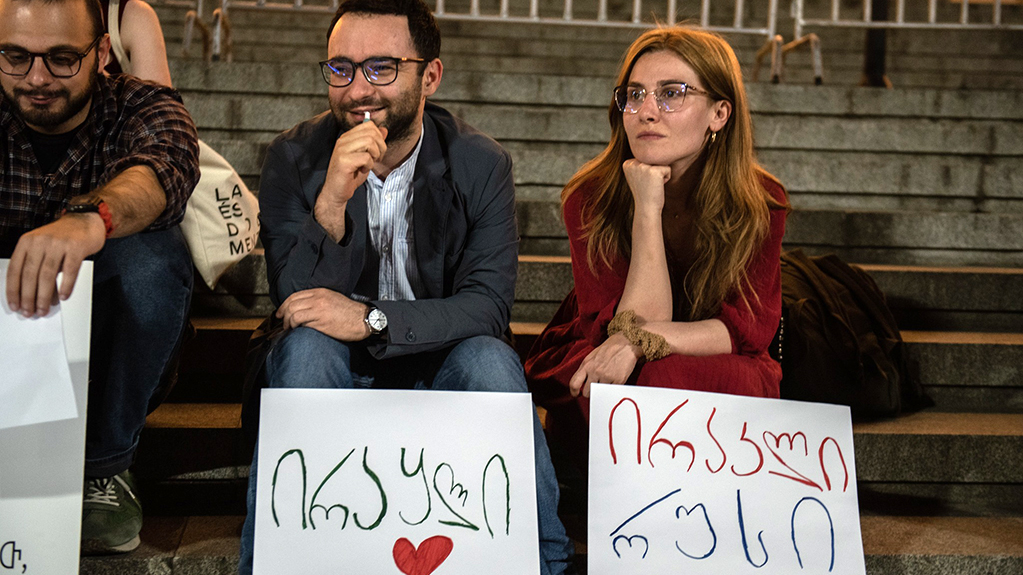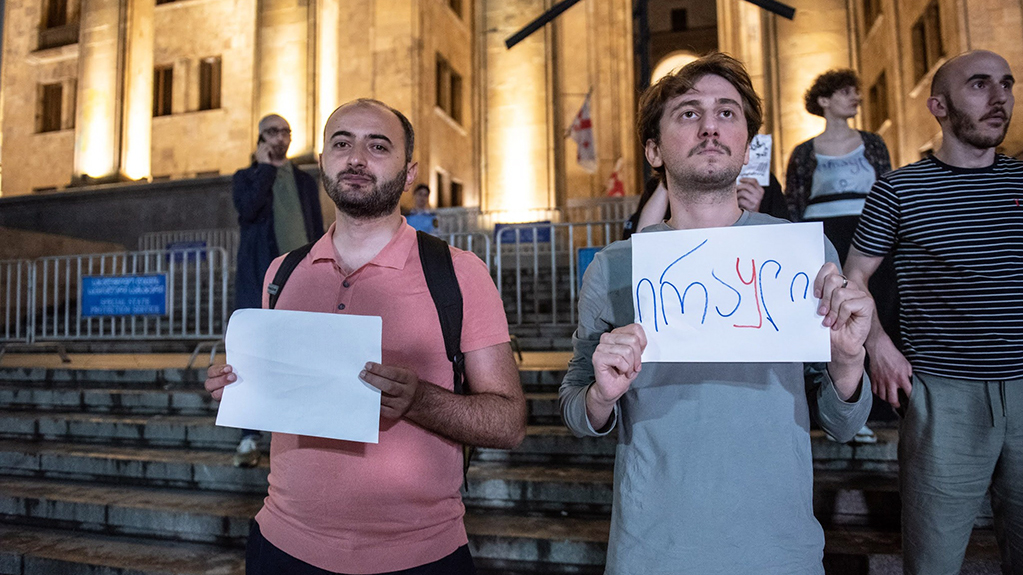Human rights defender Eduard Marikashvili was holding a blank sheet of paper during a rally of several protesters held in front of the parliament building. Lawyer Saba Brachveli and civil activist Nika Romanadze held protest signs reading “ირაყლი” (vulgar wordplay on Prime Minister’s name, suggestive of genitalia). Police detained all three of them. In the video footage of the arrest, a police officer can be heard saying that no one has the right to insult the country's prime minister. The detained human rights defenders were not allowed to contact their lawyers for several hours. All three were transferred from the capital all the way to Telavi in a temporary holding cell and were released only after the maximum holding period of 48 hours had passed.
News
Human rights defenders and civil activists gathered near the parliament on June 2 after the police arrested three people, including lawyer Shota Tutberidze. Tutberidze was sitting on the stairs in front of the parliament with a placard reading “ირაყლი”. With signs of such content, citizens were expressing their protest against the Georgian government's foreign policy, and Prime Minister Irakli Garibashvili, who said at the Global Security Forum in Bratislava, on May 30, that “one of the reasons for the start of the war was Ukraine's intention to become a member of NATO.”

A policeman first tried to confiscate the poster from Tutberidze by force, then forced him off the stairs and arrested him. A police report claims he resisted the officers and verbally insulted them. Before the lawyer was released with a written warning, human rights activists joined the rally near the parliament.
“ირაყლი” – an ugly word
“I went out on Rustaveli Avenue and held a sign with the same writing because I believe we can become a better country than Russia or Belarus. My act was a show of solidarity to my fellow countryman because they can’t be labeling police brutality as restoration of order, and we shouldn’t just quietly swallow that”, Saba Brachveli, an employee of the Open Society Foundation, wrote this speech in solitary confinement after his arrest to be read at the court session, but the trial was never scheduled before the maximum holding period of 48 hours elapsed.
Saba recalls the details of his arrest: “as I stood near the parliament, several officers approached me, led by Sergi Bzishvili, who told me to hand over my placard. I told him this was my property and declined. He told me it shows an “ugly word”, to which I replied that it was not a swear word, and even if it was, it was not against our constitution or the Strasbourg law. Moreover, the Strasbourg court has said that even the inscription “ყ*ე” (d*ck) is not a justified cause for arrest.
I don’t know what exactly angered Sergi in my speech, but he then ordered his subordinates to take me away, after which I was thrown to the ground, removed from the area, and handcuffed, and only then were they able to take away the sign.”
Saba Brachveli says that the policeman who took responsibility for his arrest was not in fact the arresting officer and he saw him for the first time at the station.
Blank Paper
Eduard Marikashvili, the head of Georgian Democracy Initiative, believes that the purpose of the arrest is to intimidate citizens so that they refrain from protesting even in the form of holding a blank sheet of paper:
“This case has clearly shown the similarities of the Georgian government to the Russian regime, which also arrests people for holding blank papers. These actions by the state look like attempts of revenge against critically disposed of people, and for this revenge, they are using the power given to them by the people.”

The lawyers believe that this is an intentional wrongful arrest, which violates Article 247 of the Criminal Code and is subject to 5 to 8-year imprisonment or deprivation of the right to hold an official position for up to three years. It is also illegal to hold a suspect for full 48 hours without sufficient grounds.
Seven people were arrested in total at June 2nd rally. The Special Investigation Service still has not started an investigation into possible wrongdoing by the employees of the Ministry of Internal Affairs (MIA).
Strasbourg Court ruling against Georgia
The European Court of Human Rights has assessed the arrest of protestors based on the content of placards, including obscene slogans, as a violation of the right to freedom of assembly and association. One of the last decisions regarding Georgia was made six months ago, on December 15, 2022.
The case Peradze and others v. Georgia concerns the arrest of “partisan gardener” Nata Peradze and six more activists for holding signs that said “პანორამა, არა *ლე!” [panorama, no d*ck] during a 2015 protest against oligarch Bidzina Ivanishvili’s project Panorama Tbilisi. One of the slogans was directed personally against the former prime minister Bidzina Ivanishvili.
According to the Strasbourg Court ruling, the video footage did not show any of the detainees voicing the slogan or disobeying police, but the Tbilisi City Court found all seven guilty of violating public order by silently hanging banners with slogans and fined all of them. The Georgian court explained that the term used in the slogan carried a “particularly offensive” meaning within the Georgian society and does not have “any political, cultural, educational, or scientific meaning.” The Court of Appeals upheld the decision by City Court.
The European Court explained that the right to freedom of assembly is one of the foundations of a democratic society and a necessity of any restriction needs to be convincingly established.
Regarding the content of the banners, the European Court took into account the assessment of the national court and agreed that the vulgar slang used was ‘’complete obscenity’’ and ‘’particularly offensive’’ in the Georgian language, however, deemed that the national court separated the vulgar nature of the phrase in question too much from its context, from its obvious purpose, and focused only on the form.
“They did not consider that Article 10 of the Convention [freedom of expression], defines that this provision is applicable not only to information or ideas that are favorably received or regarded as inoffensive or as a matter of indifference but also to those that offend, shock or disturb the State or any sector of the population.
It is also of importance that the impugned offensive statement was not directed against any individual or institution in particular, which is why it cannot be considered to be an insult or wanton denigration of anyone in particular,” stated the court.
Strasbourg Court ruled that Article 11 [freedom of assembly and association] of the Convention read in the light of Article 10 [freedom of expression] had been violated. The Court considers that the imposition of a sanction, however lenient, for an expression forming part of a legitimate public debate may have an undesirable chilling effect on freedom of expression.















